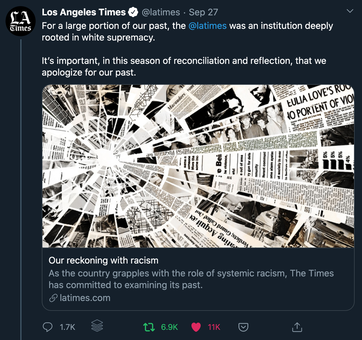|
There’s a growing trend of self-reflection across every sector these days where companies, individuals, and entire fields are doing the work to analyze how white supremacy, racial inequities, and other injustices are perpetuated through historic and contemporary policies that uplift a singular narrative or provide advantages and disadvantages across demographics. This is long overdue work and welcomed from my perspective. In order for us to create a society where all people are truly seen as equals, we must be honest and open to feedback, scrutiny, and engage in the necessary (and sometimes painful) investigative work that analyzes where our systems break down or fail to administer justice.  On September 27th, the LA Times released its equity statement “Our Reckoning with Racism” and it blew me away because it wasn’t like any I’ve seen before. Yes, organizations are releasing statements of acknowledgment that they will embark on the work necessary to listen to black voices, strive for more equitable hiring practices, stand with black and brown communities in the fight for racial justice, or even going as far to explicitly state that Black Lives Matter. This is all fine. But the LA Times' statement was not just your average run-of-the-mill equity statement. It was an admission of their role in supporting, fueling, and participating in a system that upholds and perpetuates harmful narratives about black and brown people. The Twitter thread and subsequent articles explicitly provide examples of where and when the LA Times failed BIPOC* communities in their reporting. Every reputable news source has a page about their “ethics and standards” statement and many sites have a link on this page to their diversity, equity, and inclusion statement. These statements inform the readership that they can believe what they're reading and trust that the news outlet pursues journalistic integrity (or other promises) when vetting and publishing stories. But like everything in this world, we're seeing that we can't just link out to diversity. Anti-racism is a process of policy evaluation, acts of equity, and inclusive values. I believe we will begin to see an entire anti-racism prong of media literacy meets cultural competence emerge in reporting and in media literacy (civics) education, where news organizations and journalism schools begin to hold each other accountable for reporting in a culturally competent way. Not only will we question whether a source is factual but we will begin to look at whether that article is culturally competent: who’s voices were elevated; what adjectives are they using to describe the people in the article; is the author racially biased; are these facts rooted in a history of inequity; does the author have the authority to speak for a community; and so forth. I believe we will begin to see an entire anti-racism prong of media literacy meets cultural competence emerge in journalism and in media literacy (civics) education...When we think about racism in the media, the mind quickly focuses on the egregious loud-mouths on talk radio, those "historic" (1930-60) county papers that documented lynchings, or historic ads on run-away slaves. The overt racist voices and the primary sources that contribute to telling the long history of racism in our country are the racism in plain sight. We have yet to have the courage to face the ways in which contemporary attitudes in media, the gatekeeping, the silencing of voices in newsrooms, and the failure to tell full narratives also serve to uphold the system of white supremacy that leans on a single-perspective narrative. And even though social media, online news, and blogging have in many ways democratized and dismantled print media, these outlets are often still inhospitable spaces for voices that deviate from a white, hetero-normative experience. Let's face it... Racist ideas are perpetuated in the media and images we consume, the books we read, and the content we interact with in games and on social media. Media and entertainment companies play a big role in shaping our views on political, economic, education, and social issues. They influence how we view and value ourselves and others. Media is a powerful force for unity or disunity. The way an issue or an event is reported can impact votes, the makeup of a neighborhood, or the funding that programs receive. I mean, think about what was uncovered after the 2016 election. What have we now discovered about the ways media and social media contributed to the 2016 election outcome? Nothing is neutral. It never has been. In these intensely polarizing times, "what's right" is up for political debate. But we must remain vigilant about the stories we tell, the narratives we elevate, and the opinions we value. Citizens are becoming more aware of the power of media and entertainment and media organizations are also analyzing that power internally. The airing of their own dirty laundry is a positive move by the LA Times. Looking back can be hard to do, but it’s absolutely necessary. *BIPOC - an acronym for Black, Indigenous, People of Color. Read more about it here. Mark your calendars! Media Literacy Week is October 26th - 30th. Learn how you can get involved, find resources, and more on their site: https://medialiteracyweek.us/ Read more about Media Literacy:
0 Comments
Your comment will be posted after it is approved.
Leave a Reply. |
I'm a former teacher and former college athlete, currently working to make life more equitable for all people. My mission is to get parents to partner with their child's teacher.
|
